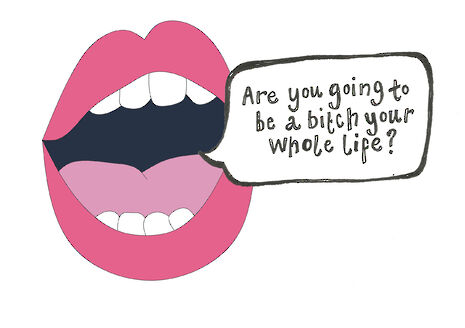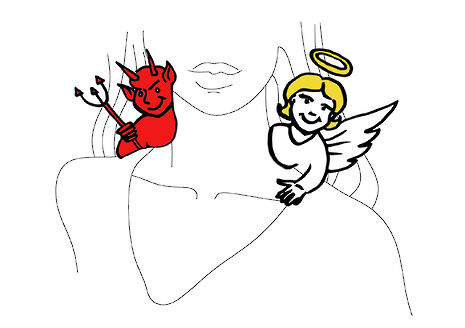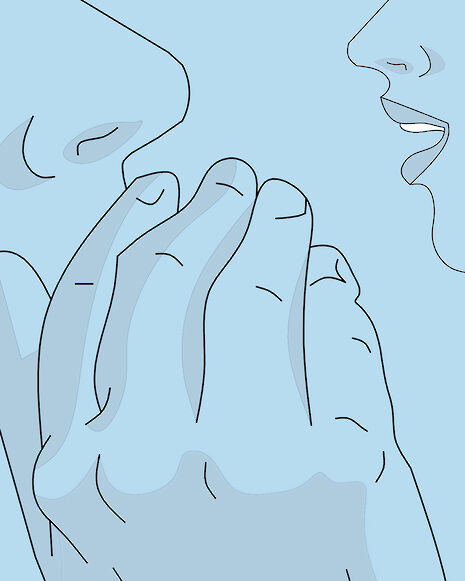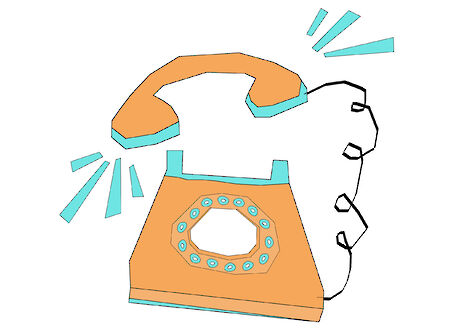I tried to give up bitching
Most of us can’t get through the day without it. Anna Hollingsworth tried to give up bitching for a whole week – and made some rather profound discoveries along the way

Hello, nice to meet you, I’m Anna and I’m a bitch destined to burn in hell.
I talk about people behind their backs and I have come to be known as a bit of a gossip. It’s gotten to the point where my friends now use ‘have you got any goss for us?’ as the standard way to start a conversation with me.
No one likes a bitch. As Eleanor Roosevelt famously and somewhat unfortunately for me, once said, “great minds discuss ideas; average minds discuss events; small minds discuss people.” Similarly, there’s a Jewish proverb which goes “loose tongues are worse than wicked hands”. If this wasn’t damning enough, there’s another Psalm which reads: “Whoever secretly slanders his neighbor, him I will destroy.” Gulp.
The idea of living my life in apprehension of eternal damnation and being branded as a small-minded busy-body was incentive enough for me to take on the task to try and give up bitching for a whole week. Seven whole days without one single snide comment or a fantastically juicy chinwag with a pal. Extremely ambitious and no small feat.
I apologise for the mother of all anticlimaxes, but no, I didn’t succeed. In fact, I failed miserably. But that is not to say I didn’t try. There were many times when I was on the verge of making a snide comment or catty remark about some mildly annoying habit of a mutual acquaintance and managed to refrain myself. On a number of occasions, I successfully caught my tongue just in time to stop myself picking up on someone else’s unkind remark and taking it into the claws-out sphere of gossip.
Yet, come one fateful dinner, I found myself asking for full reports about the previous night’s clubbing antics from friends. The classic interrogatives of ‘who got with who?’ And it didn’t stop there. Whenever I got annoyed by someone’s behavior – yes, I do get annoyed a lot – I couldn’t avoid going on a rant as soon as the person tipping over my annoyance threshold had left the room.

It wasn’t all conscious bitching, either. I’d catch myself laughing about someone’s mannerisms or quirks in a wholly good-hearted and jovial way when I realised that this, too, would qualify as talking about someone behind their back – just a few steps away on a continuum from full-on bitching. To make matters worse, my test week didn’t actually involve any interaction with my most gossip-loving friends. I don’t even want to think about the totality of the failure that hanging out with them during my weeklong break from bitching would have resulted in.
My failure to go teetotal with bitching may be embarrassing, but at least for once embarrassing myself here in print serves a higher purpose.
Despite my failure, I am completely certain that I am not alone in often being a gossiping, bitching, psychoanalysing person. It is quite simply what people do – what everyone does from time to time.
Evolutionary psychologist Robin Dunbar found back in 1997 that the vast majority of people devote about two-thirds of any conversation to gossip, irrespective of factors such as gender or social standing. These numbers come as no surprise. After all, psychoanalysing acquaintances is much more interesting than talking about the weather, or the embarrassing pitfalls of our most recent supervision or your favourite up-and-coming musician.
In more recent research, Dunbar, now a professor of psychology at Oxford, has gone so far as to claim that gossip is what makes us human. It serves as a way of transmitting vital information about who to trust, and helps us to bond with family and friends. As such, it has been crucial to human evolution: an individual’s social network is argued to be the single most important factor in keeping the individual alive. Petty gossiping hardly seems a way for the individual to grant themselves a greater chance of survival. However, the gossiping I’m referring to here can be as harmless as just keeping up with one’s social scene (even if it involves talking about people behind their backs).

The importance of gossiping to human nature is also suggested from a non-evolutionary perspective by Dr Jennifer Cole, a senior lecturer at Manchester. She found that people are not only suspicious of those who gossip too much but, interestingly, also of those who gossip too little. If we need a healthy dose of gossip to survive and to fit in, who can blame us?
However, just because something is evolutionarily and natural does not mean it should be acceptable. Just think about nutrition as a parallel: humans have a strong predisposition for fatty and sweet foods – hence the queues to the Van on Life and the droves of people going in for samples at the Fudge Kitchen. This evolutionary craving was crucial to survival in times when sufficient nutrition wasn’t very readily available.
However, in the era of supermarkets and 24/7 delivery services, the very same temptations have resulted in greater health risks. So, it leads us to ask, surely we have evolved enough grey matter to go on surviving without bitching?
When it comes to talking about people behind their backs, I believe that there are lines to be drawn, even if the Bible and a former US First Lady may not agree with me. Spreading lies, bullying, breaches of trust, and unnecessary bad-mouthing are all toxic behaviour that can hardly be a foundation of healthy social networks. Yet gossip is not inherently untrue or ill-meaning; rather, at its very basic, it is a form of sharing opinions rather than hard facts, and more often than not, those facts just happen to be speculative.
It is drilled into us by life coaches, magazines and armchair psychologists that gossiping is detrimental to relationships, and confronting issues by talking directly to the person concerned is always the best option. Who hasn’t heard of the ‘if you’ve got something to say, just said it to my face’ mantra?
More serious issues should obviously be talked about and solved with the parties involved face-to-face. These discussions can be constructive, and they can certainly serve to help avoid misunderstandings. But confronting people about every single minor flaw they may have would just wreak havoc.
For example, telling a third party how annoying you find your supervision partner’s obnoxious attention seeking or how you hate the loud slurping and munching sounds the person you’re having lunch with produces may actually just prevent you from exploding at said attention seeker or lunch-muncher unnecessarily.
In some cases, it can be argued that the net gain from releasing that bit of steam (and avoiding an unnecessary confrontation between you and that person) warrants it.

I’ve been stuck in classes with the worst kind of Hermione Granger-style ‘teacher, look at me’ types, but do I really need to risk spoiling our polite relations when I can avoid an open catfight with a little bitching – excuse me, opinion sharing – with friends, especially when after a few weeks, our paths will likely never cross again?
Conversely, if people are saying things behind my back (about, for example, my questionable forays into student journalism of dubious quality or violent love of polka dots) that aren’t necessarily very polite – as I’m sure they do – do I need to l know? Quite honestly, I’d rather not.
In a way, I think I agree with Oscar Wilde when he says: “If there is anything more annoying in the world than having people talk about you, it is certainly having no one talk about you.”
When we gossip, we fulfil what it means to be human. Of course, there’s always the risk of really hurting people – but at the same time it offers the opportunity of affirming social relations and avoiding conflicts. I won’t bad-mouth or spread lies (that’s something I would always try my best to avoid), but I won’t be continuing with my no-gossiping experiment. I have to wave a white flag at eliminating all comments spoken behind other’s backs.
My tongue may be loose and my mind may be small, but at least when I burn in hell, I’ll know that for the most part, I was just being human
 Comment / Anti-trans societies won’t make women safer14 November 2025
Comment / Anti-trans societies won’t make women safer14 November 2025 Comment / Be mindful of non-students in your societies12 November 2025
Comment / Be mindful of non-students in your societies12 November 2025 News / Controversial women’s society receives over £13,000 in donations14 November 2025
News / Controversial women’s society receives over £13,000 in donations14 November 2025 News / Stolen plate returned to Caius after 115 years12 November 2025
News / Stolen plate returned to Caius after 115 years12 November 2025 Theatre / The sultry illusions and shattered selves of A Streetcar Named Desire13 November 2025
Theatre / The sultry illusions and shattered selves of A Streetcar Named Desire13 November 2025









